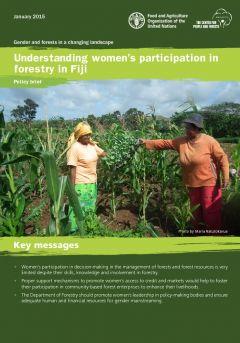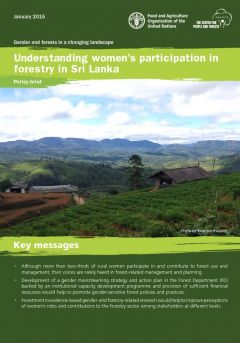Focal point
Location
The Food and Agriculture Organization of the United Nations leads international efforts to defeat hunger. Serving both developed and developing countries, FAO acts as a neutral forum where all nations meet as equals to negotiate agreements and debate policy. FAO is also a source of knowledge and information. We help developing countries and countries in transition modernize and improve agriculture, forestry and fisheries practices and ensure good nutrition for all. Since our founding in 1945, we have focused special attention on developing rural areas, home to 70 percent of the world's poor and hungry people.
Members:
Resources
Displaying 1796 - 1800 of 5074Understanding Women's Participation in Forestry in Indonesia
This brief discusses how gender perspectives are being integrated in Indonesia's forest policies, laws and regulations in terms of women's representation, participation, access and decision-making in forest use and management. The brief also highlights the key challenges that prevail and outlines recommendations to promote gender mainstreaming further in forestry.
Mainstreaming Gender into Forest Policies in Asia and the Pacific
This report was developed as a part of the regional initiative, ‘Mainstreaming gender into forest policies of developing Asia-Pacific Forestry Commission (APFC) member countries,’ funded by the Food and Agriculture Organization of the United Nations’ Regional Office for Asia and the Pacific (FAO-RAP). The report tries to understand how gender perspectives are being integrated in the forest policies of eight APFC member countries.
Understanding Women's Participation in Forestry in Cambodia
This brief discusses how gender perspectives are being integrated in Cambodia's forest policies, laws and regulations in terms of women's representation, participation, access and decision-making in forest use and management. The brief also highlights the key challenges that prevail and outlines recommendations to promote gender mainstreaming further in forestry.
Understanding Women's Participation in Forestry in Fiji
This brief discusses how gender perspectives are being integrated in Fiji's forest policies in terms of women's representation, participation, access and decision-making in forest use and management. The brief also highlights the key challenges to and offers recommendations of further promotion of gender mainstreaming in forestry.
Understanding Women's Participation in Forestry in Sri Lanka
This brief discusses how gender perspectives are being integrated in Sri Lanka's forest policies, laws and regulations in terms of women's representation, participation, access and decision-making in forest use and management. The brief also highlights the key challenges that prevail and outlines recommendations to promote gender mainstreaming further in forestry.











